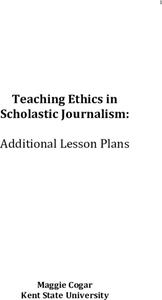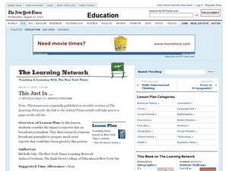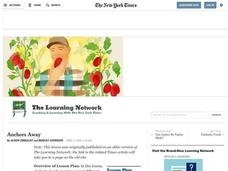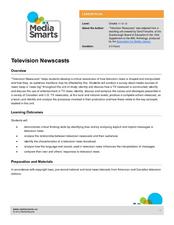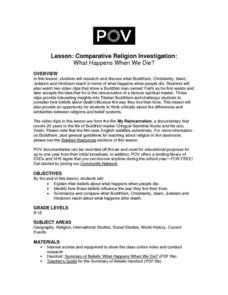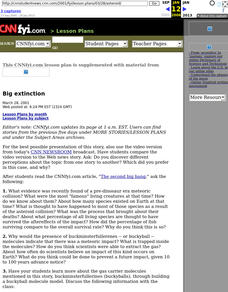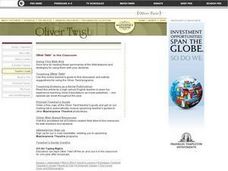Newseum
Use ‘War of the Worlds’ to Teach Media Literacy
Orson Welles' 1938 radio broadcast of "War of the Worlds" is the focus of a lesson plan that looks at the importance of clarity in broadcasting. After listening to the radio broadcast, class members discuss the ethical obligations to...
Kent State University
Teaching Ethics in Scholastic Journalism
Events in recent years have underscored the importance of a free and independent press in a democracy. Young journalists engage in lessons about the function of journalism in a democratic society, practice the steps of Bok's Ethical...
Curated OER
This Just In…
Students consider the impact a reporter has on broadcast journalism. They research a famous broadcast journalist to prepare a mock news report.
Curated OER
Anchors Away
Learners examine forms of broadcast journalism. they identify roles played by journalists in various news formats.
News Literacy Project
News Goggles: Corrections and Clarifications: Accuracy and Correcting the Record
Accuracy and fairness are key principles in journalism. It is the responsibility of reputable news organizations to correct their stories when new information is found. Viewers learn to spot these corrections and clarifications through a...
Curated OER
Television Newscasts
When we watch news broadcasts on television, we receive a much more visual perspective than when we read the newspaper. How do sets, clothing, and music contribute to our understanding of the story? Compare American and Canadian news...
News Literacy Project
News Goggles: Tracking Developing Stories
A 28-slide presentation introduces viewers to the process reports go through to track and verify developing news stories. Using the reports of the attacks at Atlanta, Georgia, massage parlors as an example, viewers are taught what to...
Facing History and Ourselves
The Power of Images
One picture but a thousand stories. As a part of a case study of how the death of Michael Brown was reported by professional news sources and on social media class members examine the reactions of various groups to a photograph taken by...
Newseum
Bias Through History: Analyzing Historical Sources
Young journalists use the E.S.C.A.P.E. (evidence, source, context, audience, purpose, and execution) strategy to evaluate historical and contemporary examples of bias in the news. The class then uses the provided discussion questions to...
Council for Economic Education
Satisfaction Please! (Part 2)
Simply understanding consumer rights may not help people solve their problems. Understanding who to turn to becomes key in many different scenarios. Teach the value of various organizations that fight for consumer rights through...
Curated OER
Confucianism in a Changing Society
A great lesson promotes thoughtful discussion, global perspectives, and links between economics and culture. Learners view four clips showing how Confucian teachings have shaped Chinese culture and how filial piety plays a role in...
Curated OER
Ethical Applications of Human Genetics
Tenth graders read about, observe case study videos, and participate in live interactive broadcasts, and maintain a log book on all of the activities pertaining to the Human Genome Project.
American Documentary
Comparative Religion Investigation: What Happens When We Die?
How do different religions offer explanations for what happens when we die? Invite your learners to consider the variance and complexity of religious beliefs, and to research and compare/contrast the concept of death and afterlife...
Curated OER
Big Extinction
Students discuss evidence of a pre-dinosaur era meteoric collision, and its impact on living creatures. They build buckyball molecule models out of marshmallows, toothpicks, and soccer balls.
Curated OER
Literature: Oliver Twist In The Classroom
Students view the Masterpiece Theatre presentation of Oliver Twist. the lesson includes plot summaries of the three episodes as well as before and after viewing activities. In addition, there are discussion and activity suggestions to...
Curated OER
Who Has the Data? Monitoring Coral Reefs
High schoolers access data to characterize coral reefs. In this scientific research lesson, students access data and explain the need for such data when monitoring coral reefs. They will identify and explain three major threats to coral...
Curated OER
Space Science:Wherever You Go, There You Are
Students explore navigation principles by observing, measuring, and interpreting data to determine locations. Using a compass, compass rose, and a transit, they plot courses and discover the workings of the Global Positioning System...
Curated OER
Civil liberties: Fundamental freedoms
Students explore civil liberties. They list and describe the fundamental freedoms guaranteed to Canadians. Students illustrate how Charter rights are applies. They examine current issues and suggest how the courts might apply Charter...



